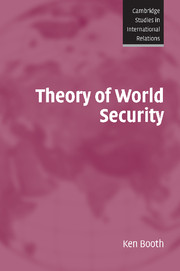Book contents
3 - Security, emancipation, community
Published online by Cambridge University Press: 05 June 2012
Summary
the Bulk of Mankind in all Ages, and in all Countries, are violently attached to the Opinions, Customs, and even Habits, which they have been used to … Sounds, Shews, Prejudices, vain and idle Terrors, Phantoms, Delusions … operate more upon them than true and strong Reasons.
John Trenchard, Enlightenment free-thinker putting down ‘folly’Chapter 1 described the morbid symptoms of a world that is not working, and stressed the gathering dangers of global business-as-usual. Chapter 2 plundered a body of ideas – critical global theorising – from which a radically different approach to world security can be fashioned. Part II begins to construct the framework of such an approach. The present chapter clarifies the most basic concepts (security, emancipation, and community). Chapter 4 explains the critical moves involved in reconceiving security (deepening, broadening, and reconstruction). Chapter 5 relates these critical moves to fundamental issues in philosophy (being, knowing, and doing). And then chapter 6 brings all the elements together into a framework of a comprehensive (transcendental, pure, and practical) critical theory of world security.
Security beyond survival
I will tell you in what consists of the summum bonum of human life: it consists in reading Tristram Shandy, in blowing a pair of bellows into your shoes in hot weather, and roasting potatoes under the grate in cold.
Archdeacon Paley in Personal and Literary Memorials (1829)If critical is the sovereign term in critical security theory, the territory it rules over is security.
- Type
- Chapter
- Information
- Theory of World Security , pp. 95 - 148Publisher: Cambridge University PressPrint publication year: 2007
- 1
- Cited by

